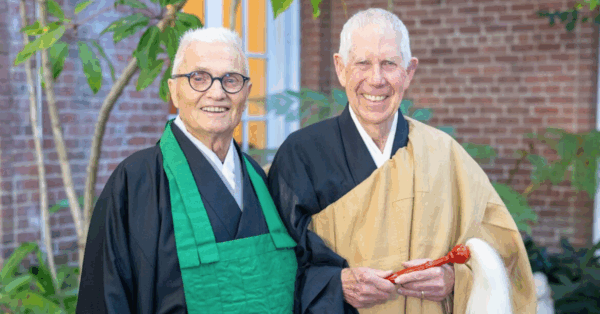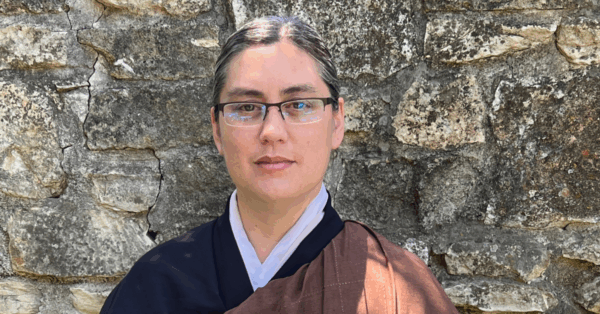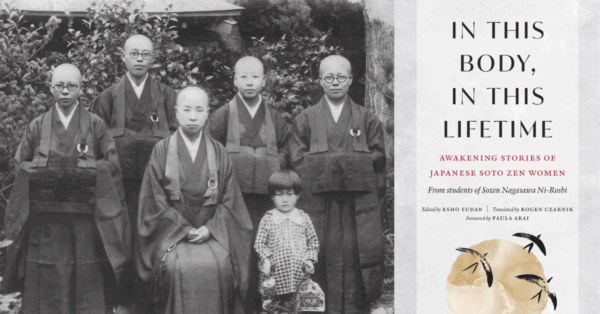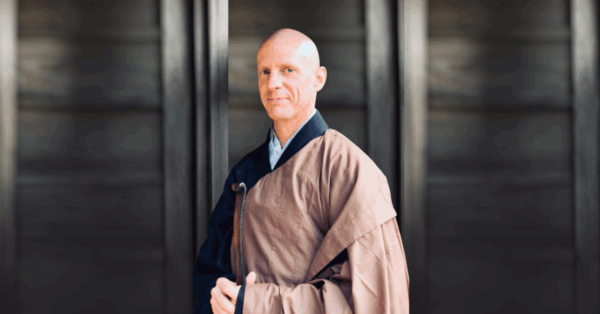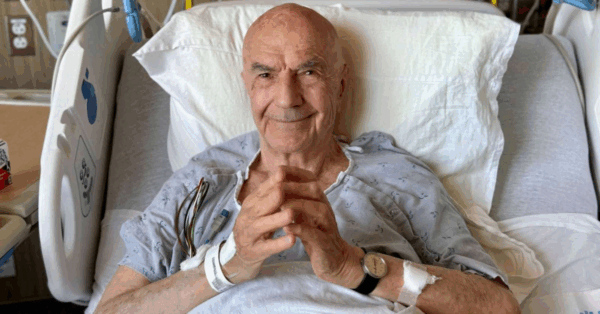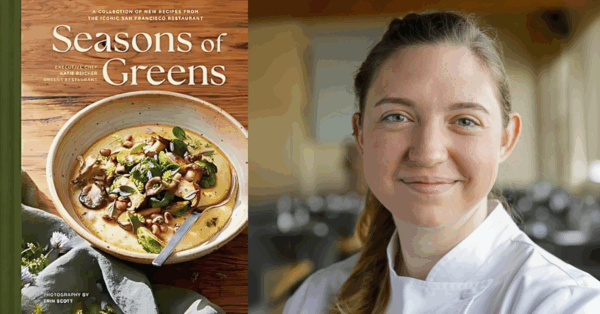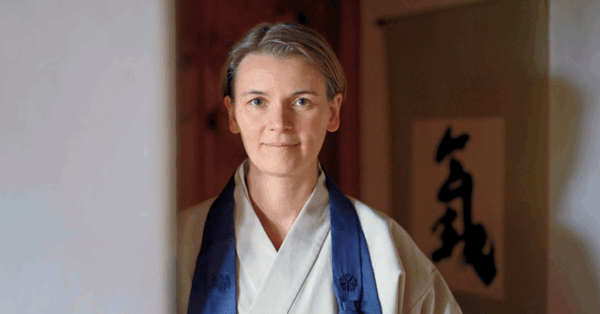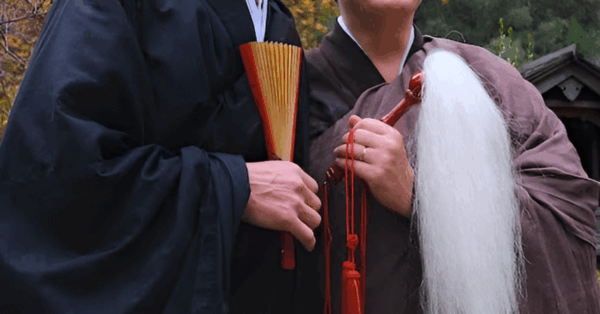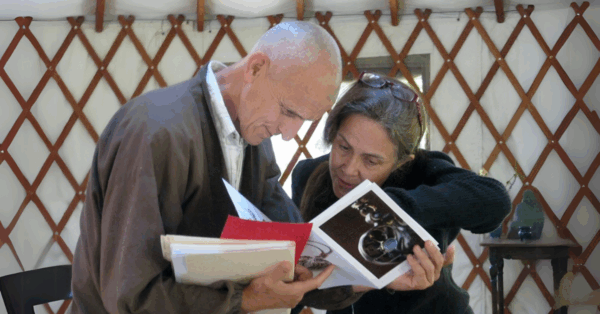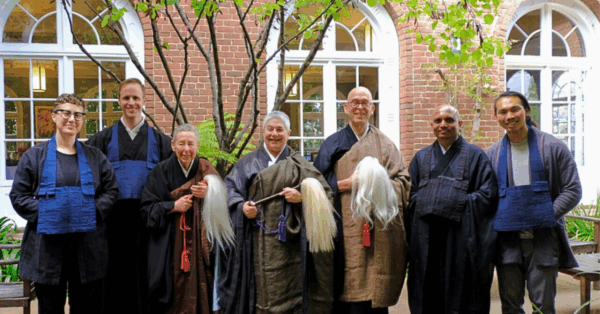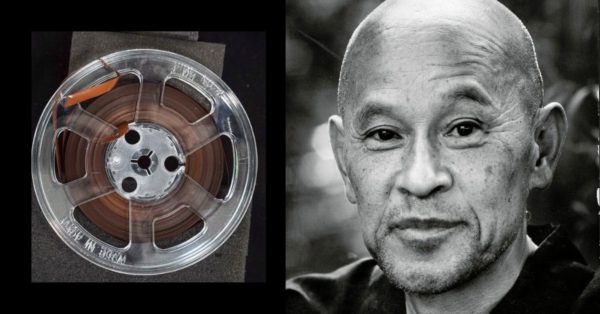
To listen to this talk, “Shosan Ceremony,” see the Suzuki Roshi Audio Archive where it is listed on the right side.
This talk was given by Suzuki Roshi at Tassajara in the summer of 1968.
Description:
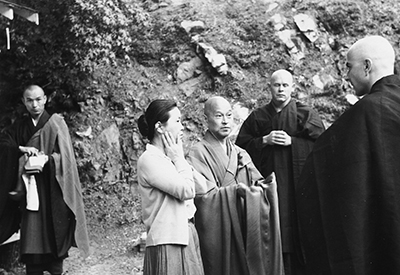
Taizan Maezumi, Mitsu Suzuki, Shunryu Suzuki, Phillip Wilson, and Richard Baker at Tassajara in 1967. Photographer unknown.
This was the last of the three 5″ reels that appeared to be from the summer of 1968, but there were no visual clues beyond the note “sounds like ZMC” (Zen Mountain Center, an alternative name for Tassajara), which it certainly does, with a loud backdrop of crickets. The audio tells us more: the tape begins with the sequence of ceremonial instruments from the procession and beginning of a shosan ceremony – a formal question and answer session, where each students comes up in turn to ask a question about practice (each student bows off to the side before and after their question which accounts for a lot of background noise on the tape). Suzuki Roshi starts by mentioning that this is the end of a seven-day sesshin.
The Wind Bell which covers that period makes no direct mention of the sesshin, but there is a report (p12) of a visit by a number of eminent Zen teachers in July, who brought with them Nyogen Senzaki’s ashes (a pioneering teacher in the early part of the 20th century); unfortunately no record of the talks given during this visit seem to have survived. But there is a passing mention: “the ashes remained on the altar until two full moons later. Then, on the evening of the third day of summer sesshin, Suzuki Roshi, Chino Sensei and the students drove up to where they had watched the moon rise before … and there enshrined the ashes.” Further sleuthing work confirms the date as September 10.
Thankfully, we have a number of recordings of shosan ceremonies—half-a-dozen from the first couple of years at Tassajara, plus the transcript but not the audio from the one held after the first sesshin in 1967. The format, and the fact that it traditionally takes place at the end of a sesshin, allows for a deeper and more considered exchange than the usual questions and answers that sometimes took place after a lecture; perhaps that explains why Suzuki Roshi only held them at Tassajara and not at Sokoji or City Center. Listening to them offers a real, intimate glimpse into how his students were absorbing his teachings at the time.
Not every student asks a question; at 1:23:22 on the tape, there is a fearsome scream—a not-untypical occurrence in the Zen tradition—and others just express gratitude or say nothing. The most moving exchange is with Trudy Dixon, who was working on editing the transcripts for Zen Mind, Beginner’s Mind, and who had been diagnosed with the cancer that killed her the following year at the age of 30. She says, “Docho Roshi, let me see who I am. [Pause] To die each moment to be reborn is the great freedom of the dharma. I’m like a small fish, I swim in and out of big death.” (27:55). Suzuki Roshi launches into an impassioned response, recognizing that her practice in the face of her illness is the essence of what he has tried to convey to his students: “Dharma is the thing to which every one of us have been striving for, and will strive for. … It is not only you, but all the patriarch and sages have been striving for it, and you are one of them. And you should be pitiful for the people who do not strive for it, who haven’t good chance to realize the necessity of striving for it. To realize the necessity of striving for it is the point to which we are making our best effort. There’s no other point to strive for. Since you have realized the necessity of striving for it, you are already one of the patriarchs and you gained that state. Don’t think Buddha and patriarchs were quite free from birth and death. They are still striving for it in the name of various sentient beings. It is most valuable thing that you realized the necessity of striving for it.” (29:14)
It is sometimes said that Zen practice is a way to prepare us for our own death, clarifying “the great matter of birth and death” as it is often phrased. Here was an example of a devoted student vividly coming face-to-face with this. Suzuki Roshi often subsequently referred to her as an outstanding disciple.
- To view all of the talks that have currently been released and to learn more about this project, see the Suzuki Roshi Audio Archive.
- Please donate to the preservation of San Francisco Zen Center’s audio archives.
- Non-monetary support is also welcome. This collection of talks is a living, evolving archive that depends on input from people like you to unlock the wisdom it contains. Several of the newly discovered talks are in need of transcription, and nearly all can benefit from listeners adding descriptions and keyword tags to improve searchability. To get started, visit the Suzuki Roshi Audio Archive page for many ways to engage.


